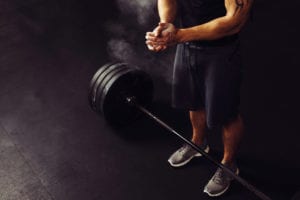Written by Greg Arnold, DC, CSCS. Twelve weeks of supplementation with ubiquinol (CoQ10) significantly improved markers of oxidative stress. In addition, CoQ10 kept urinary biomarkers for measuring cell damage constant in participating subjects, but only after the first exercise period of the exercise program.
 The health benefits of exercise are numerous and include reducing the risk of heart disease, high blood pressure, heart failure, depression, and diabetes; a reduced risk of mortality, less risk of cancer, and reduced rates of metabolic syndrome 1,2. But with regular and strenuous exercise comes increased levels of cell damage which, over time, may decrease performance, alter several hormonal processes, and increase susceptibility to infection 3,4. As a result, finding ways to maintain cellular health after exercise is important.
The health benefits of exercise are numerous and include reducing the risk of heart disease, high blood pressure, heart failure, depression, and diabetes; a reduced risk of mortality, less risk of cancer, and reduced rates of metabolic syndrome 1,2. But with regular and strenuous exercise comes increased levels of cell damage which, over time, may decrease performance, alter several hormonal processes, and increase susceptibility to infection 3,4. As a result, finding ways to maintain cellular health after exercise is important.
Fortunately, research suggests that CoQ10 may be a benefit to cellular health after strenuous exercise. A 2016 study 5 involved 100 healthy, well-trained male athletes (not elite) aged 30 to 46. They received either 200 milligrams of CoQ10 (50 subjects) or placebo (50 subjects) per day for 2 weeks. Before and after the study, each subject completed two exercise tests with a rest period of 24 hours. Blood and urine samples were collected from each subject at 5 different times:
- Before and after the supplementation period
- After the first exercise test
- 24 hours after the first exercise test
- After the second exercise test
The strenuous exercise tests both consisted of 10 bodybuilding exercises completed twice with a rest period of 5 minutes between sets. Each exercise was performed for 20 seconds with a 40-second rest period between exercises, with heart rate kept at 60–70% of their maximum heart rate.
After two weeks of CoQ10 supplementation, the CoQ10 group showed two significant improvements compared to the placebo group:
- Urinary levels of isoprostanes, regarded as “one of the most widely recognized and trusted biomarkers” for measuring cell damage, especially during physical exercise 6,7, stayed the same in the CoQ10 group between the start of the study and after the first exercise period (1.4 nanograms/milliliter) while increasing by 46% in the placebo group (1.3 to 1.9 ng/m, p < 0.05).
- Blood levels of 8OHdG, regarded as “a critical marker of oxidative stress” in the blood 8, decreased by 15.4% in the CoQ10 group between the start of the study and after the 24-hour rest period after the first exercise session (41.0 to 34.7 ng/dL) compared to a 0.3% decrease in the placebo group (42.9 to 42.8 ng/dL, p < 0.05).
Significance was not reached for the other four measurement times (p > 0.05).
For the researchers, “because CoQ10 has properties intimately involved in energy production, prevents peroxidative damage to membrane phospholipids and reduces free radical-induced oxidative damage to proteins and mitochondrial DNA 9,10, it could be suitable for this muscle-protective supplementation.”
Source: Sarmiento A. “Short-term ubiquinol supplementation reduces oxidative stress associated with strenuous exercise in healthy adults: A randomized trial. Biofactors. 2016 May 19. doi: 10.1002/biof.1297. [Epub ahead of print]
© 2016 BioFactors
Posted November 7, 2016.
Greg Arnold is a Chiropractic Physician practicing in Hauppauge, NY. You can contact Dr. Arnold directly by emailing him at PitchingDoc@msn.com or visiting his web site at www.PitchingDoc.com.
References:
- Haskell WL, Lee I-M, Pate RR, et al. Physical activity and public health: updated recommendation for adults from the American College of Sports Medicine and the American Heart Association. Circulation. 2007;116(9):1081.
- Lee DC, Pate RR, Lavie CJ, Sui X, Church TS, Blair SN. Leisure-time running reduces all-cause and cardiovascular mortality risk. J Am Coll Cardiol. 2014;64(5):472-481.
- Radak Z, Chung HY, Koltai E, Taylor AW, Goto S. Exercise, oxidative stress and hormesis. Ageing research reviews. 2008;7(1):34-42.
- Eijsvogels TM, Molossi S, Lee DC, Emery MS, Thompson PD. Exercise at the Extremes: The Amount of Exercise to Reduce Cardiovascular Events. J Am Coll Cardiol. 2016;67(3):316-329.
- Sarmiento A, Diaz‐Castro J, Pulido‐Moran M, et al. Short‐term ubiquinol supplementation reduces oxidative stress associated with strenuous exercise in healthy adults: A randomized trial. Biofactors. 2016;42(6):612-622.
- Nikolaidis MG, Kyparos A, Vrabas IS. F(2)-isoprostane formation, measurement and interpretation: the role of exercise. Prog Lipid Res. 2011;50(1):89-103.
- Czerska M, Zielinski M, Gromadzinska J. Isoprostanes – A novel major group of oxidative stress markers. International journal of occupational medicine and environmental health. 2016;29(2):179-190.
- Valavanidis A, Vlachogianni T, Fiotakis C. 8-hydroxy-2′ -deoxyguanosine (8-OHdG): A critical biomarker of oxidative stress and carcinogenesis. Journal of environmental science and health Part C, Environmental carcinogenesis & ecotoxicology reviews. 2009;27(2):120-139.
- Littarru GP, Tiano L. Clinical aspects of coenzyme Q10: an update. Nutrition. 2010;26(3):250-254.
- Saha SP, Whayne TF, Jr. Coenzyme Q-10 in Human Health: Supporting Evidence? South Med J. 2016;109(1):17-21.
